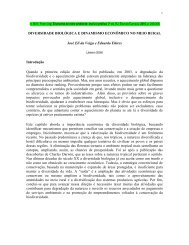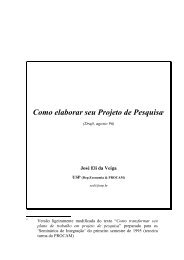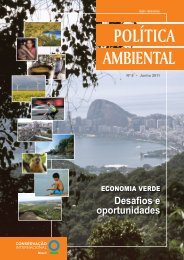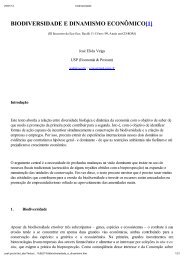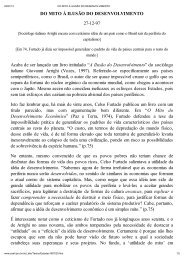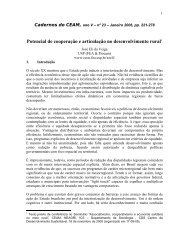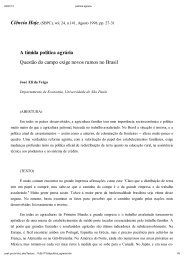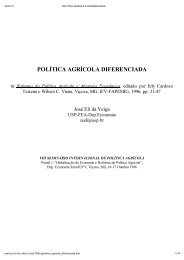sustainable development 20 years on from the ... - José Eli da Veiga
sustainable development 20 years on from the ... - José Eli da Veiga
sustainable development 20 years on from the ... - José Eli da Veiga
Create successful ePaper yourself
Turn your PDF publications into a flip-book with our unique Google optimized e-Paper software.
238<br />
(b)<br />
(c)<br />
Allocate financial, human and technological resources to streng<strong>the</strong>n <strong>the</strong> enforcement of<br />
envir<strong>on</strong>mental laws and regulati<strong>on</strong>s and increase <strong>the</strong> costs of n<strong>on</strong>-compliance<br />
Increase <strong>the</strong> profitability of activities, sectors and technological choices that have a smaller<br />
envir<strong>on</strong>mental impact and create or enhance incentives to promote <strong>the</strong>m. <strong>Eli</strong>minate direct<br />
or indirect subsidies for activities or technologies that <strong>da</strong>mage <strong>the</strong> envir<strong>on</strong>ment<br />
Envir<strong>on</strong>mental criteria can be applied to public and private investment decisi<strong>on</strong>s, government<br />
procurement, <strong>the</strong> emissi<strong>on</strong> of pollutants and access to natural resources, whe<strong>the</strong>r in <strong>the</strong> form of laws or<br />
regulati<strong>on</strong>s or in <strong>the</strong> form of <strong>the</strong> costs of polluti<strong>on</strong> and envir<strong>on</strong>mental degra<strong>da</strong>ti<strong>on</strong> (charges for polluti<strong>on</strong><br />
rights, access rights or royalty fees). 4 This would bring private or market costs more closely into line with<br />
social or ec<strong>on</strong>omic costs, <strong>the</strong>reby sending correct market or normative signals.<br />
(d)<br />
Encourage envir<strong>on</strong>mental and ecosystem protecti<strong>on</strong> by generating ec<strong>on</strong>omic alternatives for<br />
communities located in areas pr<strong>on</strong>e to degra<strong>da</strong>ti<strong>on</strong>, in accor<strong>da</strong>nce with <strong>the</strong> cultural values<br />
of each country and community<br />
The social benefits of protecting <strong>the</strong> envir<strong>on</strong>ment and biodiversity are generally greater than those<br />
actually perceived by <strong>the</strong> private agents resp<strong>on</strong>sible for deciding whe<strong>the</strong>r to c<strong>on</strong>serve or degrade <strong>the</strong><br />
envir<strong>on</strong>ment. Envir<strong>on</strong>mental protecti<strong>on</strong> can be promoted by undertaking new activities that are based <strong>on</strong><br />
better knowledge and greater capacity for managing ecosystems. In <strong>the</strong> regi<strong>on</strong>, for example, countries<br />
such as Costa Rica and Brazil have implemented systems of payment for envir<strong>on</strong>mental services.<br />
Promoting <str<strong>on</strong>g>sustainable</str<strong>on</strong>g> tourism as part of a broader poverty-reducti<strong>on</strong> and job-creati<strong>on</strong> strategy<br />
which includes training and targets women and young people in particular can also help to create a<br />
virtuous circle between protecti<strong>on</strong> of <strong>the</strong> envir<strong>on</strong>ment and ecosystems and job creati<strong>on</strong>.<br />
Special attenti<strong>on</strong> should be paid to establishing a system for accessing and distributing <strong>the</strong><br />
benefits arising <strong>from</strong> <strong>the</strong> use of genetic resources and relevant technologies given that <strong>the</strong> possessi<strong>on</strong> of<br />
traditi<strong>on</strong>al knowledge is an income source for populati<strong>on</strong>s that c<strong>on</strong>serve forests and related biological<br />
diversity (United Nati<strong>on</strong>s, <str<strong>on</strong>g>20</str<strong>on</strong>g>10).<br />
(e)<br />
Create or adjust mechanisms such as royalties to channel resources into human capital training<br />
and o<strong>the</strong>r sources of competitiveness to facilitate transformati<strong>on</strong> of <strong>the</strong> producti<strong>on</strong> structure<br />
In a regi<strong>on</strong> that is highly dependent <strong>on</strong> n<strong>on</strong>-renewable natural resources, public policy should<br />
seek to increase <strong>the</strong> capital available for its citizens. The loss of natural capital without a corresp<strong>on</strong>ding<br />
increase in human capital, infrastructure and innovati<strong>on</strong> will have an adverse impact <strong>on</strong> <strong>the</strong> well-being of<br />
future generati<strong>on</strong>s. This is especially relevant in <strong>the</strong> mining and oil extracti<strong>on</strong> sectors (see chapter I).<br />
4<br />
This can be accomplished, for example, by calculating <strong>the</strong> book values of pollutants. At <strong>the</strong> investment<br />
evaluati<strong>on</strong> stage, this would alter a project’s estimated profit ratio by providing an increasingly accurate<br />
indicati<strong>on</strong> of its social and envir<strong>on</strong>mental costs.



